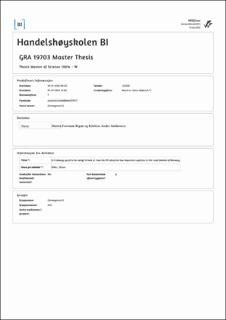| dc.description.abstract | A lead market (LM) describes an area where a new innovation design is successfully adopted prior to any other markets (Beise, 2004), and can be used to understand the diffusion of new products and services. While previous LM literature does well in defining national characteristics, the role of the state and explaining consumer behavior, those distributing the new innovations have been neglected. This study fills the previous gap in literature by addressing how the Norwegian LM adoption of EVs have impacted the country’s authorized suppliers, and to what extent they perceive that being early is an advantage. By conducting interviews with managers on topics related to new car sales, used car sales, service and import, this study finds that the overall implications from a LM adoption is not necessarily beneficial for the suppliers. The value of the current study is to understand how the LM suppliers are impacted, and can be influenced related to the diffusion of new innovations. This may be particularly meaningful when deciding on governmental interventions to enhance market penetration of new green technologies. | en_US |
